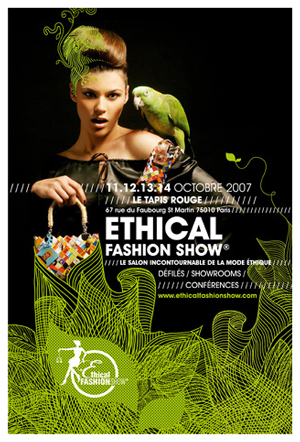03 Aug Saying you’re “green” isn’t enough in the fashion world: “ethical fashion” requires a larger commitment.

ETHICAL FASHION SHOW® 2007, 4th Edition
OCTOBRE 11th to 14th
At the Tapis Rouge 67, rue du Faubourg St-Martin 75010 Paris
Come October, Paris will be hosting the fourth Ethical Fashion Show. Attracting thousands of eager buyers and a growing number of labels alike,(more than 60 labels and 4,000 attendees last year), major retailers like Marks & Spencer and the fashion cataloger La Redoute are actively expanding their ethically sourced apparel lines.
The term “ethical fashion”–which goes beyond the fashion terms “eco” or “green” fashion is still not as high on the US radar as it should be. Beyond utilizing eco-friendly or organic materials, ethical fashion denotes the additional commitment to ensuring humane labor standards and fair-trade wages are met for garment workers — wages that afford workers “a relatively comfortable quality of life within the context of their local area,” according to Fair Indigo, one of the pioneering U.S. brands.
It’s going to take some time, but with all signs pointing to fair-trade issues having increasing impact on apparel going forward, pioneering brands are finding lucrative niches, and mainstream players are beginning to pay attention. Growing US companies like: Fair Indigo, American Apparel (which uses only U.S. labor), TeamX and NoSweatApparel are getting more and more attention for their commitment to “sweatshop-free” practices.
U.S.-based companies–including apparel brands Eddie Bauer, Eileen Fisher, Donna Karan, Levi Strauss, Lilly Pulitzer, Liz Claiborne, Nike, Reebok, Perry Ellis and Phillips-Van Heusen, and retailers Nordstrom, Sears and Wal-Mart–are all members of Business for Social Responsibility, a nonprofit that provides companies with practical assistance in “demonstrating respect for ethical values, people, communities and the environment.”

